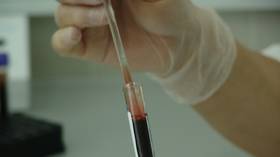All in vein: New blood test can predict if you'll die in next 5 to 10 yrs

A new type of blood test promises to predict a person's risk of dying within the next 10 years based on over a dozen different biomarkers. With 83 percent accuracy, it’s proving far better than any existing conventional models.
Researchers examined 16 years’ worth of data from 44,168 people aged between 18 and 109, of whom 5,512 died during their study.
By testing 14 different biomarkers associated with general health, as opposed to risk of contracting specific diseases, the researchers were able to produce what they claim is the most accurate all-cause mortality test currently available.
Also on rt.com It’s in your blood: New Alzheimer’s test lets doctors detect dementia in ‘under 1 hour’They tested biomarkers including various amino acid levels, ‘good’ and ‘bad’ cholesterol levels, fatty acid imbalances, inflammation, overall immune response and glucose control. However, the blood test is a long way off broad clinical deployment.
The test is too short-term to provide total mortality endpoints for the general population but can generate an overall mortality rating for use in, say, evaluating a new drug's potential efficacy against a baseline mortality rate for the elderly.
The researchers were keen to home in on a patient's biological rather than calendar age with a view to more productively and predictably treating any potential future illnesses to which they may be susceptible.
Also on rt.com Blood donation breakthrough sees scientists convert all types to O using gut bacteriaOne criticism which limits the scope of the study is that all participants were primarily of European descent, so more research is needed across different ethnicities.
Furthermore, the team admits that while the blood test is “a marker of your current health and physical vulnerability” it does not concretely “predict how long you will live as you have a hand in it yourself.”
“If the blood test indicates your physical vulnerability, if it tells you how long you’ll live, and your family see that and you change your lifestyle, you may live twice as long,” said Dr. Joris Deelen of the Max Planck Institute for Biology of Ageing in Cologne, Germany.
Think your friends would be interested? Share this story!














